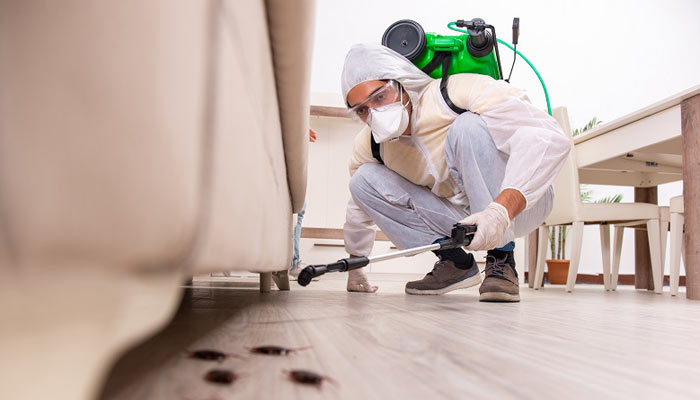Trustworthy A1 Portland Pest Control Bed Bugs - Reliable Solutions
Trustworthy A1 Portland Pest Control Bed Bugs - Reliable Solutions
Blog Article
Effective Insect Control Solutions: An In-Depth Consider Extermination Techniques and Prevention Procedures
In the realm of parasite control services, the successful monitoring of invasions calls for a meticulous technique that incorporates numerous methods and measures for both eradication and avoidance. From Integrated Insect Management (IPM) approaches that prioritize lasting solutions to chemical elimination strategies made for targeted elimination, the toolbox against bugs is diverse and large. Organic control approaches and physical prevention procedures offer alternate paths to successfully combating unwanted trespassers. Nonetheless, the key to a thorough bug control strategy lies not simply in the techniques themselves, but also in the precise specialist inspection treatments that precede and notify them. By understanding the complexities of each approach and exactly how they interaction, one can absolutely realize the intricacy and effectiveness of modern-day insect control services.

Integrated Bug Administration (IPM) Strategies
Integrated Parasite Monitoring (IPM) Strategies incorporate a detailed approach to pest control that concentrates on avoidance, control, and surveillance methods to successfully take care of pest populaces. By integrating numerous strategies, IPM intends to decrease the influence of pests while likewise decreasing the dependence on chemical pesticides. Avoidance exists at the core of IPM, stressing techniques like proper hygiene, maintenance of health, and securing entrance indicate hinder bugs from infesting buildings. Monitoring plays a vital role in IPM by regularly checking and recognizing pest degrees to figure out the proper intervention thresholds. Control methods in IPM focus on the use of physical, organic, and cultural approaches before turning to chemical treatments as a last resort. These strategies consist of introducing all-natural killers, habitat modification, and using capturing devices to maintain insect populaces in check. In general, IPM fosters a environmentally conscious and lasting strategy to pest management, promoting long-lasting solutions that guard both human wellness and the environment.
Chemical Elimination Methods
Chemical extermination techniques are frequently used in parasite control services to efficiently eliminate parasite populations that present a threat to human health and building. These strategies include the use of various chemical materials specifically designed to target and eliminate pests such as bugs, rats, and various other undesirable creatures. The application of chemicals, insecticides, rodenticides, and other chemical representatives is carefully regulated to make sure maximum efficiency while minimizing dangers to people, animals, and the atmosphere.
Among the essential benefits of chemical extermination techniques is their ability to give fast and targeted outcomes, making them specifically beneficial in situations of serious infestations or immediate pest control requirements - a1 portland bed bug exterminator. Nonetheless, it is important to emphasize the significance of correct handling, application, and disposal of these chemical items to stop unexpected injury
Additionally, integrated parasite monitoring (IPM) techniques frequently combine chemical extermination strategies with various other approaches such as hygiene, habitat alteration, and biological controls to create a sustainable and detailed bug control method. By including chemical elimination methods deliberately within an IPM structure, pest control services can properly handle bug populations while decreasing potential risks to human health and wellness and the setting.
Biological Bug Control Methods
Employing natural killers and bloodsuckers to handle pest populaces is a lasting technique called biological parasite control. This method utilizes the all-natural systems of the ecological community to regulate bug populaces without relying upon artificial chemicals. One common biological control technique involves introducing all-natural opponents of the target pest varieties, such as ladybugs for aphid control or nematodes for termite infestations. These natural killers eat the pests, aiding to maintain their populaces in check.
Another effective biological control strategy is using microbial insecticides. These are normally taking place microbes, such as infections, bacteria, and fungi, that specifically target and infect specific parasite varieties. By making use of these microbial agents, pest populations can be effectively reduced without harming valuable microorganisms or triggering harm to the here are the findings environment.
Physical Parasite Prevention Measures
Executing physical insect avoidance actions involves making use of obstacles and architectural alterations to discourage bugs from infesting a property or entering. Setting up door moves, screens on home windows, and securing fractures in the structure can aid avoid bugs like bugs and rats from getting gain access to inside.
One more physical avoidance measure is using obstacles like secure fencing to maintain larger parasites such as deer or raccoons away from the property. Installing mesh or cable displays around yards can secure plants from being damaged by insects. Proper waste management, consisting of safeguarding garbage cans with tight-fitting lids, is crucial in discouraging pests like pests, rodents, and raccoons. By applying these physical parasite prevention actions, homeowner can dramatically reduce the risk of bug problems and the damage they can trigger.
Expert Parasite Inspection Treatments
Performing methodical and extensive bug inspections is a fundamental facet of expert parasite management methods. Expert parasite assessors are educated to thoroughly check out homes for signs of invasions, recognizing pest species, entrance points, and helpful problems.

Final Thought
In conclusion, effective bug control solutions employ a selection of methods, including Integrated Bug Management approaches, chemical extermination techniques, organic controls, and physical prevention actions. Professional parasite inspection procedures play a crucial duty in determining and resolving pest problems in a prompt fashion. By carrying out a mix of these methods, home proprietors can efficiently take care of and avoid parasite invasions.
From Integrated Insect Management (IPM) techniques that focus on sustainable services to chemical extermination strategies created for targeted removal, the collection against bugs is multifaceted and large.Integrated Insect Management (IPM) Strategies incorporate a thorough approach to pest control that focuses on prevention, monitoring, and control methods to properly discover this take care of pest populations.Chemical extermination techniques are frequently utilized in parasite control solutions to successfully get rid of pest populations that pose a risk to human health and wellness and home.Employing all-natural killers and bloodsuckers to take care of bug populaces is a sustainable approach understood as biological pest control.In verdict, efficient insect control services employ a range of techniques, including Integrated Bug Administration techniques, chemical elimination approaches, organic controls, and physical avoidance measures.
Report this page